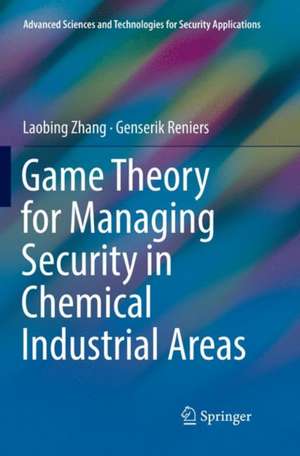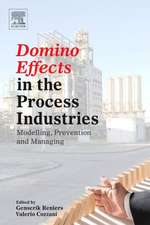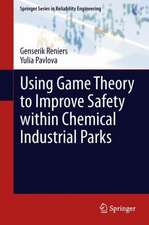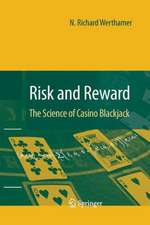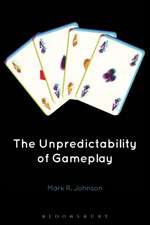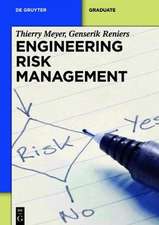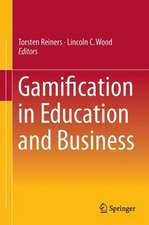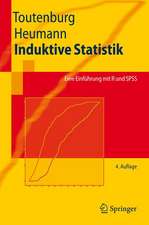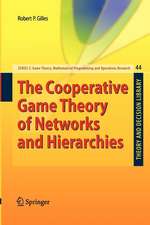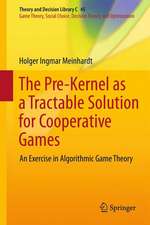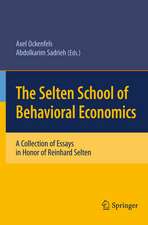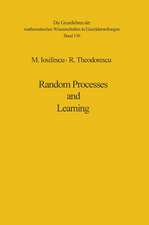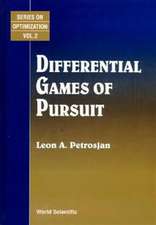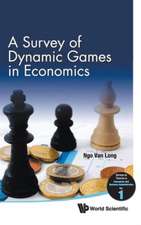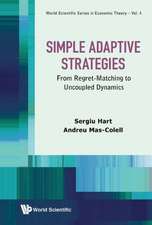Game Theory for Managing Security in Chemical Industrial Areas: Advanced Sciences and Technologies for Security Applications
Autor Laobing Zhang, Genserik Reniersen Limba Engleză Paperback – 22 dec 2018
In this book, game theoretic models for protecting chemical plants as well as clusters are proposed. Different equilibrium concepts are explored, with user-friendly explanation of how to reflect them to realistic cases. Based on efficient analysis of the properties of security issues in chemical plants/clusters, models in this book are capable to support resources allocations, cost-effectiveness analysis, cooperation incentives and alike.
| Toate formatele și edițiile | Preț | Express |
|---|---|---|
| Paperback (1) | 381.00 lei 6-8 săpt. | |
| Springer International Publishing – 22 dec 2018 | 381.00 lei 6-8 săpt. | |
| Hardback (1) | 388.13 lei 6-8 săpt. | |
| Springer International Publishing – 18 iul 2018 | 388.13 lei 6-8 săpt. |
Din seria Advanced Sciences and Technologies for Security Applications
- 20%
 Preț: 934.69 lei
Preț: 934.69 lei - 18%
 Preț: 738.20 lei
Preț: 738.20 lei - 5%
 Preț: 672.98 lei
Preț: 672.98 lei - 18%
 Preț: 903.93 lei
Preț: 903.93 lei - 20%
 Preț: 994.92 lei
Preț: 994.92 lei - 18%
 Preț: 791.88 lei
Preț: 791.88 lei - 20%
 Preț: 991.60 lei
Preț: 991.60 lei - 18%
 Preț: 969.61 lei
Preț: 969.61 lei - 15%
 Preț: 704.36 lei
Preț: 704.36 lei - 15%
 Preț: 704.36 lei
Preț: 704.36 lei - 15%
 Preț: 644.95 lei
Preț: 644.95 lei - 20%
 Preț: 1162.37 lei
Preț: 1162.37 lei - 17%
 Preț: 491.10 lei
Preț: 491.10 lei - 15%
 Preț: 643.65 lei
Preț: 643.65 lei - 20%
 Preț: 889.10 lei
Preț: 889.10 lei - 20%
 Preț: 936.37 lei
Preț: 936.37 lei - 15%
 Preț: 649.22 lei
Preț: 649.22 lei - 20%
 Preț: 1273.74 lei
Preț: 1273.74 lei - 20%
 Preț: 1051.84 lei
Preț: 1051.84 lei - 18%
 Preț: 783.98 lei
Preț: 783.98 lei - 18%
 Preț: 1223.88 lei
Preț: 1223.88 lei - 20%
 Preț: 480.04 lei
Preț: 480.04 lei - 15%
 Preț: 648.42 lei
Preț: 648.42 lei - 18%
 Preț: 1224.36 lei
Preț: 1224.36 lei -
 Preț: 381.43 lei
Preț: 381.43 lei - 15%
 Preț: 586.38 lei
Preț: 586.38 lei - 20%
 Preț: 937.81 lei
Preț: 937.81 lei - 20%
 Preț: 1068.42 lei
Preț: 1068.42 lei - 18%
 Preț: 734.59 lei
Preț: 734.59 lei - 18%
 Preț: 1120.18 lei
Preț: 1120.18 lei - 24%
 Preț: 590.40 lei
Preț: 590.40 lei - 18%
 Preț: 1007.17 lei
Preț: 1007.17 lei - 24%
 Preț: 815.81 lei
Preț: 815.81 lei - 24%
 Preț: 747.51 lei
Preț: 747.51 lei - 20%
 Preț: 937.81 lei
Preț: 937.81 lei - 18%
 Preț: 721.30 lei
Preț: 721.30 lei - 15%
 Preț: 646.75 lei
Preț: 646.75 lei - 15%
 Preț: 698.62 lei
Preț: 698.62 lei - 18%
 Preț: 794.07 lei
Preț: 794.07 lei - 18%
 Preț: 738.06 lei
Preț: 738.06 lei -
 Preț: 388.13 lei
Preț: 388.13 lei - 18%
 Preț: 778.01 lei
Preț: 778.01 lei
Preț: 381.00 lei
Nou
Puncte Express: 572
Preț estimativ în valută:
72.90€ • 76.12$ • 60.34£
72.90€ • 76.12$ • 60.34£
Carte tipărită la comandă
Livrare economică 04-18 aprilie
Preluare comenzi: 021 569.72.76
Specificații
ISBN-13: 9783030064730
ISBN-10: 3030064735
Pagini: 157
Ilustrații: XIV, 157 p. 36 illus.
Dimensiuni: 155 x 235 mm
Greutate: 0.25 kg
Ediția:Softcover reprint of the original 1st ed. 2018
Editura: Springer International Publishing
Colecția Springer
Seria Advanced Sciences and Technologies for Security Applications
Locul publicării:Cham, Switzerland
ISBN-10: 3030064735
Pagini: 157
Ilustrații: XIV, 157 p. 36 illus.
Dimensiuni: 155 x 235 mm
Greutate: 0.25 kg
Ediția:Softcover reprint of the original 1st ed. 2018
Editura: Springer International Publishing
Colecția Springer
Seria Advanced Sciences and Technologies for Security Applications
Locul publicării:Cham, Switzerland
Cuprins
Introduction.- 1. Protecting Process Industries from Intentional Attacks: the State of the Art.- 2. Intelligent Interaction Modelling: Game Theory.- 3. Single Plant Protection: A Game-Theoretical Model for Improving Chemical Plant Protection.- 4. Single Plant Protection: Playing the Chemical Plant Protection Game with Distribution-free Uncertainties.- 5. Single Plant Protection: Playing the Chemical Plant Protection Game involving Attackers with Bounded Rationality.- 6. Multi-Plant Protection: A Game-Theoretical Model for Improving Chemical Clusters Patrolling.- 7. Case Studies. 8. Conclusions and Recommendations.
Notă biografică
Laobing Zhang was born in 1989 in Leiyang, P.R.China. In 2014, he obtained a MSc in System Simulation at the National University of Defense Technology in Changsha. He joined the Safety and Security Science Group in TUDelft as a PhD researcher, focused on game theory. More specifically, his research on using game theoretical models to improve security in chemical plants (clusters) successfully captures intelligent interactions between security management within chemical plants (the defenders) and potential attackers (the adversaries).
Genserik Reniers was born in 1974 in Brussels. He obtained a MSc in Chemical Engineering at the Vrije Universiteit Brussel in Brussels, and received his PhD in 2006 in Applied Economic Sciences from the University of Antwerp, Belgium. He founded the Antwerp Research Group on Safety and Security in 2006 at the University of Antwerp, coordinating multi- and interdisciplinary safety and security research. From 2013 on, he is a full professor at the University of Antwerp in Belgium as well as at the Delft University of Technology in the Netherlands (at the Safety and Security Science Group), both in a part-time capacity. Furthermore, since 2015 he also acts as the Academic Director of the Leiden-Delft-Erasmus Centre for Safety and Security, which is an inter-university initiative in the Netherlands for enhancing risk research and education.
Genserik Reniers was born in 1974 in Brussels. He obtained a MSc in Chemical Engineering at the Vrije Universiteit Brussel in Brussels, and received his PhD in 2006 in Applied Economic Sciences from the University of Antwerp, Belgium. He founded the Antwerp Research Group on Safety and Security in 2006 at the University of Antwerp, coordinating multi- and interdisciplinary safety and security research. From 2013 on, he is a full professor at the University of Antwerp in Belgium as well as at the Delft University of Technology in the Netherlands (at the Safety and Security Science Group), both in a part-time capacity. Furthermore, since 2015 he also acts as the Academic Director of the Leiden-Delft-Erasmus Centre for Safety and Security, which is an inter-university initiative in the Netherlands for enhancing risk research and education.
Textul de pe ultima copertă
This book systematically studies how game theory can be used to improve security in chemical industrial areas, capturing the intelligent interactions between security managers and potential adversaries. The recent unfortunate terrorist attacks on critical infrastructures show that adversaries are intelligent and strategic. Game theoretic models have been extensively used in some domains to model these strategic adversaries. However, there is a lack of such advanced models to be employed by chemical security managers.
In this book, game theoretic models for protecting chemical plants as well as clusters are proposed. Different equilibrium concepts are explored, with user-friendly explanation of how to reflect them to realistic cases. Based on efficient analysis of the properties of security issues in chemical plants/clusters, models in this book are capable to support resources allocations, cost-effectiveness analysis, cooperation incentives and alike.
In this book, game theoretic models for protecting chemical plants as well as clusters are proposed. Different equilibrium concepts are explored, with user-friendly explanation of how to reflect them to realistic cases. Based on efficient analysis of the properties of security issues in chemical plants/clusters, models in this book are capable to support resources allocations, cost-effectiveness analysis, cooperation incentives and alike.
Caracteristici
Systematically studies how to mathematically improve security within chemical industrial areas Discusses extensively different scenarios such as complete information and incomplete information, rational and irrational players Proposes an innovative resource allocation algorithm for a multiple-layer closed system as well as an innovative game theoretic model for chemical cluster protection
